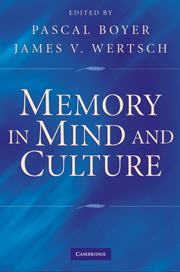Book contents
- Frontmatter
- Contents
- List of Contributors
- PART I IN MIND, CULTURE, AND HISTORY: A SPECIAL PERSPECTIVE
- PART II HOW DO MEMORIES CONSTRUCT OUR PAST?
- PART III HOW DO WE BUILD SHARED COLLECTIVE MEMORIES?
- 5 Collective Memory
- 6 The Role of Repeated Retrieval in Shaping Collective Memory
- 7 Making History: Social and Psychological Processes Underlying Collective Memory
- 8 How Does Collective Memory Create a Sense of the Collective?
- PART IV HOW DOES MEMORY SHAPE HISTORY?
- PART V HOW DOES MEMORY SHAPE CULTURE?
- Index
- References
7 - Making History: Social and Psychological Processes Underlying Collective Memory
Published online by Cambridge University Press: 05 June 2012
- Frontmatter
- Contents
- List of Contributors
- PART I IN MIND, CULTURE, AND HISTORY: A SPECIAL PERSPECTIVE
- PART II HOW DO MEMORIES CONSTRUCT OUR PAST?
- PART III HOW DO WE BUILD SHARED COLLECTIVE MEMORIES?
- 5 Collective Memory
- 6 The Role of Repeated Retrieval in Shaping Collective Memory
- 7 Making History: Social and Psychological Processes Underlying Collective Memory
- 8 How Does Collective Memory Create a Sense of the Collective?
- PART IV HOW DOES MEMORY SHAPE HISTORY?
- PART V HOW DOES MEMORY SHAPE CULTURE?
- Index
- References
Summary
The field of history is premised on the idea that knowledge of our past can inform our behaviors in the future. Indeed, this idea is central to many assumptions within personality, developmental, and clinical psychology. Implicit in this thinking is that history is somehow made up of immutable facts that are set in stone in society's memory. Who, after all, could doubt the accuracy of America's role in World War II, the facts surrounding the discovery of the New World by Columbus in 1492, the bravery and upstanding characters of the men who defended the Alamo in 1845, or the profound effect of the Magna Carta in 1215? These events, of course, are not as straightforward as we were taught in grade school. Events such as these undergo rethinking, reinterpreting, and even forgetting to become part of the permanent fabric of collective memory. But the transition from cultural upheaval to history does not happen all at once. The macrocosm of how a collective memory is built over centuries takes place on a much smaller scale beginning in the days, weeks, and months following an event.
The purpose of this chapter is to suggest that our current psychological state shapes our thinking about historical events in the same way that historical events shape our current thinking. Just as the key to the future may be the past, the key to the past may be the present. What about an event that makes it memorable?
- Type
- Chapter
- Information
- Memory in Mind and Culture , pp. 171 - 193Publisher: Cambridge University PressPrint publication year: 2009
References
- 15
- Cited by



